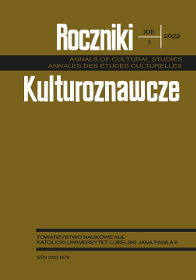The Body-Organism Difference as a Bridge between Particular Sciences and Philosophy in Understanding Human Person
Abstract
The article copes with a plurality of sciences in general and focuses in the human-related sciences, which present different cognitive results. There is difficult to co-ordinate them because of the difference in methods, aims and formal objects of sciences, whereas the material object of various sciences - the real man exists as the only subject, with a definite and clearly determined substance. In a consequence, they produce different concepts of man. Is it possible to co-ordinate or to reconcile these various information about human being, especially these from particular sciences with the philosophical anthropology?
A general understanding of the biological organism is of this kind that it is an object of science, but the notion of organism has been present in philosophy quite a long time—from the ancient times. Thus, an outline of the problem appears, namely the distinction between the organism, as an object of possible experience (fundamentally internal, but also external) and the body in the metaphysical sense, as an sub-ontic element of the human being. From the metaphysical point of view it seems (and that is my proposition or may be only a point mentioned anywhere by some authors, which I would like especially stress), that this whole—consisting of its organic parts, all unified in systemic reciprocal dependencies and various relations—is only accidental to human substance. This human substance—is a person. This specific “set of accidentals” constituting the human organism is subordinated (subjected) to the substance and exists in it and by it.
Such an understanding of the organism and more precisely described distinction between it and the body can determine the field of interest of philosophy and other sciences, and simultaneously create a bridge between them. Human organism could be a good object of various research in the field of particular sciences. But the scientists should not forget about metaphysic and existential background of the human organism. From the other hand, the philosophers looking for the necessary causes of the human being have to take in consideration this necessary and specific set of accidentals (a human organism) and the particular knowledge of it provided by the scientists.
References
Ballauff, Theodor. “Organismus.” In Historisches Wörterbuch der Philosophie, Bd. 6. Edited by Joachim Ritter, and Karlfried Gründer, 1330–1336. Darmstadt: Wissenschaftliche Buchgesellschaft, 1984.
Kamiński, Stanisław. “Notes on the Metaphilosophy of Man.” In Krąpiec, Mieczysław A., l-Man: An Outline of Philosophical Anthropology. Translated by Marie Lescoe, Andrew Woznicki, Theresa Sandok et al., 363 nn. New Britain: Mariel Publications, 1983.
Krąpiec, Mieczysław A. l-Man: An Outline of Philosophical Anthropology. Translated by Marie Lescoe, Andrew Woznicki, Theresa Sandok, et al. New Britain: Mariel Publications, 1983
Maryniarczyk, Andrzej. “Is the Human Soul Sexed? In Search for the Truth on Human Sexuality.” Studia Gilsoniana 9, no. 1 (2020): 87–142.
Maryniarczyk, Andrzej, and Arkadiusz Gudaniec. “Metafizyka człowieka w ujęciu Krąpca.” In Encyklopedia filozofii polskiej, vol. 2, 108–120. Lublin: Polskie Towarzystwo Tomasza z Akwinu, 2011.
Milcarek, Paweł. Teoria ciała ludzkiego w pismach św. Tomasza z Akwinu. Warszawa: ADAM, 1994.
Norkowski, Jacek M., OP. “Lekarz w służbie życia czy śmierci. Prawdziwa czy fałszywa alternatywa?” In Spór o początek i koniec życia ludzkiego, edited by Andrzej Maryniarczyk, Arkadiusz Gudaniec, Zbigniew Pańpuch, 457–486. Lublin: Polskie Towarzystwo Tomasza z Akwinu, 2015.
Otsason, Reet. “Życie po śmierci ciała. Hipoteza anima separata. Refleksje filozoficzne.” In Spór o początek i koniec życia ludzkiego, edited by Andrzej Maryniarczyk, Arkadiusz Gudaniec, Zbigniew Pańpuch, 337–358. Lublin: Polskie Towarzystwo Tomasza z Akwinu, 2015.
Pańpuch, Zbigniew. Spór o cielesność. Analiza ujęć wybranych problemów u tomistów egzystencjalnych oraz propozycja wprowadzenia do antropologii filozoficznej rozróżnienia między ciałem a organizmem. Lublin: Polskie Towarzystwo Tomasza z Akwinu, Wydawnictwo KUL, 2015.





